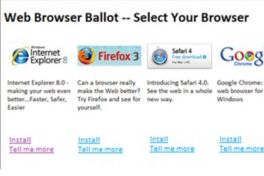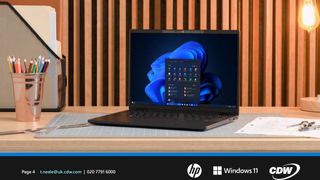Microsoft unveils more browser ballot details
Microsoft has said it's 'not easy to accept' advertising competitors' browsers inside its own system.

Microsoft has unveiled more details of its browser ballot screen, designed to offer users a choice of browsers to keep EU competition regulators at bay.
The new plan will present Microsoft users with a screen offering them the choice to download and set as default any of the major browser choices. The ballot plan has had a warm reception from the European Commission, leading Microsoft to ditch previous plans to ship a special version of Windows 7 without Internet Explorer.
Dave Heine, vice president and deputy general counsel, explained in a blog post that the ballot idea will only affect PCs in Europe that have IE installed as the default browser. Technically, manufacturers could install any browser they choose, but most stick with IE.
Once a customer has brought their shiny new PC home, installed Windows and connected to the internet, Microsoft will automatically update the system, prompting it to run the ballot software program. It will also be rolled out to older computers running Vista or XP via the update system.
"If IE is the default browser, the user will be presented with a list of other leading browsers and invited to select one or more for installation," said Heiner, adding that the page will direct users online to download their choice of browser, let them set it as default, and turn off access to IE.
"Technically, this consumer ballot screen will be presented as a web page that can be updated over time as new browsers become available," said Heiner. In other words, IE will be used to let users download another browser.
"The ballot screen would make it obvious to Windows users that they have a variety of choices when it comes to web browsing software," he said.
Get the ITPro. daily newsletter
Receive our latest news, industry updates, featured resources and more. Sign up today to receive our FREE report on AI cyber crime & security - newly updated for 2024.
Heiner said the screen will lead some users to switch away from IE, but claimed the opposite won't happen. "It is unlikely to lead to any users switching to IE, since the screen will not be presented to Windows users whose default is Firefox, Safari, Chrome, Opera or any other browser," he said.
Unsurprisingly, Microsoft isn't too keen on the idea, Heiner admitted. "As you might imagine, it was not easy for Microsoft to accept the idea that we would essentially promote directly competing software from within our flagship product, Windows," he said.
That said, Microsoft thinks it's a better option than removing IE from new versions of Windows, a route the firm has just decided not to take.
Heiner said: "Still, we believe that this approach is better for all concerned, including computer manufacturers and browser vendors and most of all consumers than an approach focused on removing Internet Explorer from Windows."




